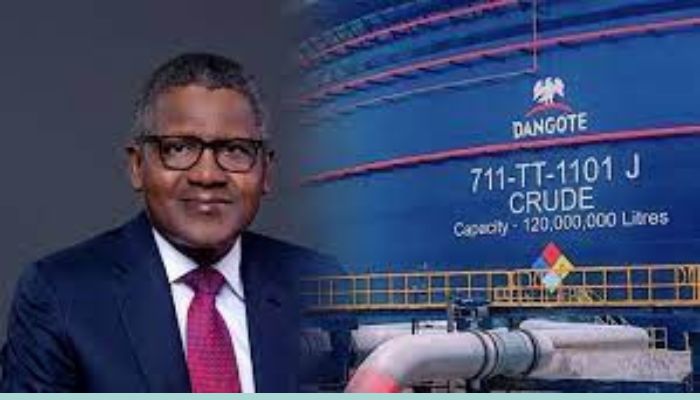Over 650 ships lift oil from Dangote Refinery to global market under one year, says management
The management of Dangote Refinery has disclosed that over 650 international ships have lifted petroleum products from the refinery in less than a year to countries in Europe and Asia.
Captain Rana, Head of Marine, Dangote Refinery who made this disclosure this when a delegation led by King Bubaraye Dakolo, the Chairman of Bayelsa Traditional Rulers Council visited the massive refinery, said this is a high turnover for a new refinery terminal.
Rana said more ships are waiting on high sea to lift oil to more international markets. According to him, the terminal has about 120 kilometers of pipelines under the sea-bed from the terminal.
He explained that the ships are offshore because of the shallow of the water.
Read also: Nigeria’s oil production slumps by 16.1% during PENGASSAN, Dangote rift – NNPC
Rana teasingly said that though Nigeria got its independence in 1960 but said Nigeria really got its independence when Dangote Refinery started to produce petrol. “This refinery is true sign of independence, when you produce your own goods without relying on outside”.
Also speaking, Reno Omokri, former presidential aide to former president Goodluck Jonathan and advocate of grow Naira, grow Nigeria initiative who was among the delegation said that in Nigeria, it is not really the volume of the money one has, but what is more important is the value of the money.
He explained that the money Nigerians hold will not have value, if Nigeria does not export products. “It will not have value if we do not replace imports with locally produced goods and services”.
“Dangote Refinery is the reason why Nigeria is no longer the largest petrol importer in Africa. South Africa has overtaken Nigeria. “Nigeria is now the largest exporter of petroleum products in West Africa”, Omokri said.
He challenged Nigerians whether in government, in labour unions, and in the private sector that it is better for Nigerians to earn money that has value.
According to him, the more ships lift oil from Dangote Refinery, the more the Naira has value and that is why we all need to support Dangote Refinery to work.
He recalled that for a long time, Nigeria has been having trade deficits. But last year, we had a trade surplus of $14 billion. This year, Nigeria is about to surpass that figure.
Read also: Dangote, oil cartel and the inevitability of change
His message to Nigerians was to support and buy Nigerian products. “When you are buying products, such as petrol, be intentional and purposeful to buy Nigerian refined products”.
Omokri said that “when we buy foreign products, we are driving down the value of the naira”.
King Dakolo said he was overwhelmed by the investment at Dangote Refinery. He described Dangote Refinery as a revolution which Nigeria must try to sustain.
He strongly believed that the investment will make a lot of positive difference in the lives of Nigerians and it must be encouraged.
“ We in the Niger Delta have a sense of fulfilment that, after years of not making the best of our natural resources, God has raised a man like Alhaji Aliko Dangote and the Dangote Refinery to end the distortions in the value chain of Nigeria’s oil and gas downstream industry, by making local refining of our resources a possibility”.
The king reiterated that the Niger Delta and Nigeria benefit and profit more when Nigeria’s oil and gas are locally refined and globally marketed.
He called on the Federal, State, and Local Governments, the organised private sector, and most especially unions to cooperate with Dangote as he refines locally.
He advised, especially PENGASSAN to understand Nigerians’ pains and not erode the gains.
Read also: Oil & gas suppliers protest Dangote’s direct supply of petroleum products to consumers
“Our refineries would have been working since 2007, when the Obasanjo administration sold a 51% stake in the Port Harcourt and Kaduna refineries to a consortium called Bluestar Oil, of which Aliko Dangote was the principal promoter.
What happened? PENGASSAN went on a strike over the sale, and as a direct consequence of that strike, the late President Yar’adua cancelled the sale. For eighteen years, those refineries remained comatose after spending $18 billion.
Dakolo therefore said “When you talk about a cabal in the oil sector ensuring that Nigerians keep paying unnecessarily high prices for oil and gas products, that cabal are the oil unions.

